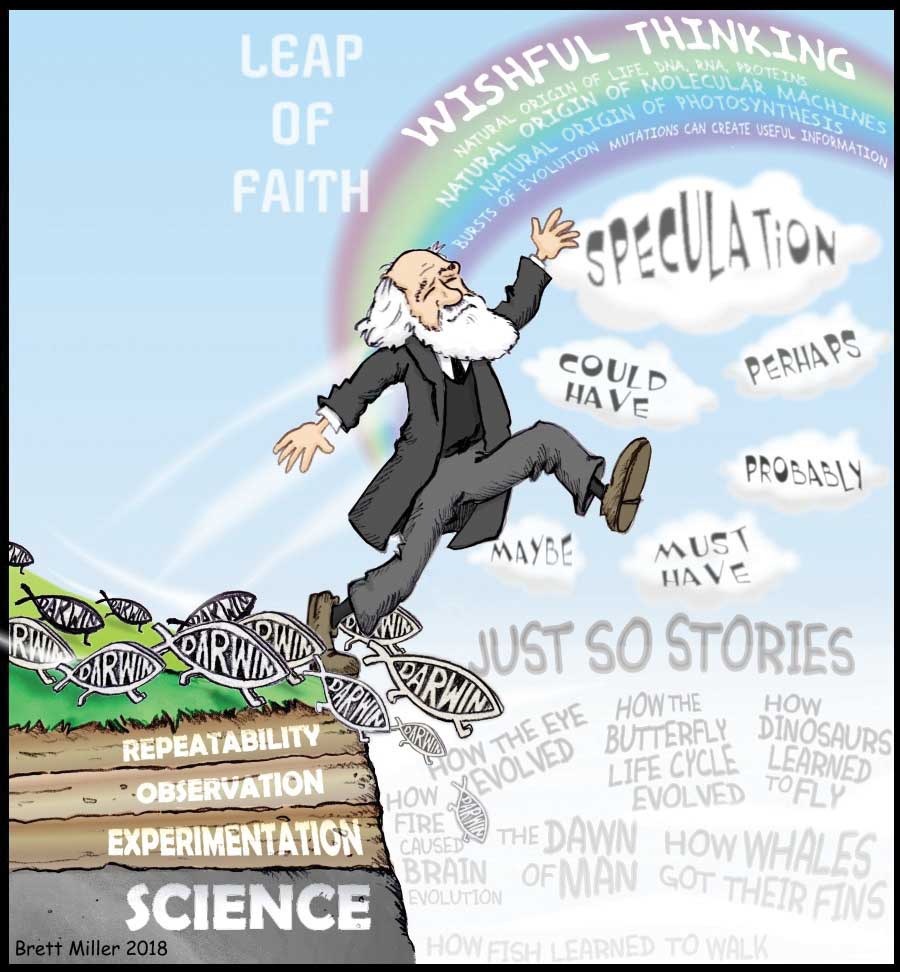Darwin’s theory and Kipling’s Just So Stories
Brett Miller is a cartoonist for the website Creation-Evolution Headlines (CrEv.info). While his other cartooning efforts are great, this one below, titled “Leap of Faith,” (which he’s graciously shared with us) is my favorite. He’s packed so much in here, with the rainbow made up of key explanations that evolution is missing, and directly underneath all the “weasel words” that evolutionary accounts so often employ. And then, further down, a reference to how evolutionary accounts resemble a particular type of fiction: Just-So Stories.
In 1902 Rudyard Kipling published his book Just So Stories with short chapters on topics like: how the elephant got its trunk, how the leopard got its spots, how the camel got its hump, and how this animal and that got their peculiar features. While evolutionists wouldn’t appreciate the comparison, often times their evolutionary explanations bear more than a passing resemblance to Just So Stories. Kipling tells us that the elephant got its long trunk because a crocodile stretched it. Evolutionists tell us that giraffes got their long neck because long necks help them reach high enough to get the leaves on the highest branches. Is one idea more scientific than the other? Were either observed or can either be proven by repeatable experimentation? No, no, and no. Both make for interesting stories…and that’s all they are. So keep Miller’s comic in mind the next time you hear a report about some new evolutionary discovery, and ask whether evidence is being offered, or simply a clever story.

Factoids about your favorite Christmas songs
Did you know…
- The text (though not the tune) of O Come, O Come Emmanuel has roots that could go as far back as the 6thcentury
- Isaac Watts based Joy to the World on the second half of Psalm 98, 96:11-12 and Genesis 3:17–18.
- Jingle Bells was not originally intended as a Christmas song, but was probably written for Thanksgiving celebrations.
- In 1700 While Shepherds Watch Their Flocks by Night became one of the very first hymns authorized to be sung by the Anglican Church (before 1700 only Psalms could be sung).
Oh Canada!
- How do you get a mob of Canadians to disperse? You say, “Please disperse.”
- What do Canadians students get on their tests? Straight eh’s.
- How do you get a Canadian to apologize? Step on his foot.
Red and yellow, black and white…
Creationist Ken Ham has a solution to the problem of racism. All we have to do is make people understand their true origins:
“[The Bible] says all people are descendants of one man and one woman, Adam and Eve. That means there’s only one race of people… I remember after talking on this once a man told me, ‘When I filled out my census form and it said, “What race are you?” I wrote down “Adam’s.”’”
SOURCE: “Genesis: The Key to Reclaiming the Culture” DVD
For sale, cheap: New Kids on the Block collection
In a speech some years ago in British Columbia, Pastor Douglas Wilson laid out a way of evaluating music. He compared different types of music to different types of plates. Some music, he said, is like your grandmother’s fine china: it takes some effort to use, but it will last for generations. This is classical music like Bach or Beethoven.
Other music is more like CorningWare – it isn’t quite as refined but might be more popular and it can be passed on from one generation to the next. Wilson thought this was like folk music.
Finally, one type of music is more like paper plates. It is designed to be used and thrown away. We consume it, it doesn’t take a lot of effort to use, and we don’t hand it on. Into this category Wilson slotted pop music.
So one of the easiest questions to ask when evaluating music is whether you’d pass it on to your kids. And if, in five or ten years, you’ll be embarrassed to own up to owning it, why are you listening to it now?
The wit and wisdom of Winston Churchill
Churchill had a way with words, inspiring his island nation in their darkest hours with just the right turn of a phrase. His most famous speech was given on June 4, 1940, after the British had been forced to flee the mainland. This was a massive defeat, but an even bigger miracle. More than 300,000 Allied troops were able to evade what seemed certain capture when, with the help of hundreds of private watercraft owned and operated by British citizens, they were able to retreat across the Channel to England. It was then that Churchill rallied his nation promising that should the Nazis come:
“…we shall defend our island, whatever the cost may be, we shall fight on the beaches, we shall fight on the landing grounds, we shall fight in the fields and in the streets, we shall fight in the hills; we shall never surrender.”
And that’s far from the only memorable sound-bite the man uttered. Here’s ten of his very best quotes:
- A lie gets halfway around the world before the truth has a chance to get its pants on.
- Courage is what it takes to stand up and speak; courage is also what it takes to sit down and listen.
- A fanatic is one who can’t change his mind and won’t change the subject.
- If you have ten thousand regulations you destroy all respect for the law.
- A pessimist sees the difficulty in every opportunity; an optimist sees the opportunity in every difficulty.
- Some regard private enterprise as if it were a predatory tiger to be shot. Others look upon it as a cow that they can milk. Only a handful see it for what it really is – the strong horse that pulls the whole cart.
- The truth is incontrovertible, malice may attack it, ignorance may deride it, but in the end; there it is.
- Success consists of going from failure to failure without loss of enthusiasm.
- My most brilliant achievement was my ability to be able to persuade my wife to marry me.
A trick question
When did Moses enter the Promised Land? Ah, you say, but that trick question isn’t all that tricky: everyone knows Moses never entered the Promised Land. God told him to speak to the rock at Meribah (Numbers 20) and water would come out, but instead Moses struck the rock twice, and for this disobedience God told Moses he would not lead Israel across the Jordan. He showed Moses the Promised Land from high atop Mount Nebo (Deut. 34:4-5) and then Moses died, never stepping a foot in it.
But while it is true Moses died before entering, it turns out he probably did still visit the Promised Land. In Matthew 17 we read that Peter, James, and John went up with Jesus to the top of a high mountain where Jesus was then transfigured, “his face shone like the sun,” and his garments became “as white as light.” And then two people appeared next to Jesus and began talking with him: Elijah and Moses! So how’s that for a fun trick answer?
But as trick questions go, the answer to this one isn’t as clear as we might like, because it’s not certain that this mountain (which isn’t named in the Scriptures) was actually in the Promised Land. Two hypothesized locations (and there are others) are Mount Tabor, which is within the boundaries, and Mount Hermon, which is not.
So, maybe the better trick question is, when might Moses have entered the Promised Land?













